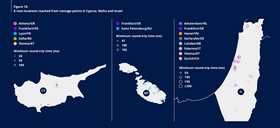The RIPE Network Coordination Centre has recently published an Internet country report for Cyprus, Malta and Israel. We have included a summary of the Report and you may download the full PDF report from the corresponding link at the end of this article.
Report Summary
Cyprus, Israel and Malta all have a long history of Internet development that is reflected today in their competitive markets and high penetration rates. Infrastructure and market development continue, with significant ongoing and future investment projects planned.
The networks in each of the three countries benefit from a good level of interconnectivity, and this redundancy provides the overall system with resiliency. This is an especially pertinent issue for Cyprus, Israel and Malta, as all three countries are either islands themselves or rely on connections with islands for their international interconnection, and are particularly vulnerable to bottlenecks or single points of failure as a result. However, we also see that the three countries have a large and diverse number of connections to the global Internet via their upstream providers, which helps mitigate this risk and reduces the potential for disruptions or outages.
Routing is generally optimised, resulting in fast response times, and we see some evidence that local exchange points are being used in order to keep domestic traffic local. However, there are also a few routing anomalies in which quite distant exchange points seem to be favoured over local options, which unnecessarily increases costs,
foreign dependencies and risk of disruption. Similarly, routing decisions to access the domain name system
occasionally send requests to quite distant root name server instances, although we tend to see this balance out when considering more than one root name server.
In comparison with one another, the three countries offer an interesting portrait of the potential influence of regulation: Israel’s Ministry of Communications’ IPv6 requirement for Internet service providers had an immediate and significant impact on IPv6 uptake in the country, while the other two remain at nearly zero capability despite their relatively large amounts of IPv6 address space. Despite high levels of mobile use in all three countries and relatively high IPv4 per capita rates, all three countries – but especially Cyprus and Malta – will need to further invest in IPv6 deployment in order to meet the demands of future growth and emerging technologies. With a relatively small number of players, these countries could make large strides in a relatively short amount of time, given the required commitment from the major network operators.
It’s worth noting that all of the observations in this report are based on active paths, and we cannot know what “hidden” world of backups exists that would automatically take over in the case of any disruptions. Whatever
redundancy does exist would provide the system with even more resiliency.
Source: labs.ripe.net (2021)
Download Report (PDF): https://labs.ripe.net/documents/178/RIPE_NCC_Internet_Country_Report_Cyprus_Israel_Malta_Dec_2021.pdf






















